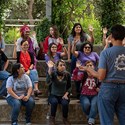Hispanic Serving Institution (HSI)
What is a Hispanic Serving Institution (HSI)?
Northwest Vista College is federally designated as a Hispanic-Serving Institution (HSI), defined in Title V of the Higher Education Act as an institution of higher learning with a full-time equivalent undergraduate student enrollment that is at least 25% Hispanic. The Hispanic student enrollment at NVC is 66%. It mirrors San Antonio's Hispanic population, according to the 2022 Census.gov website.
What does it mean to be a Hispanic Thriving Institution?
Through our mission, purpose, and strategic planning, NVC will be a Hispanic Thriving Institution by nurturing a culture of belonging, providing high-quality learning resources, career and social support, and high-value programs that lead to family-sustaining wages for Latinx students to reach their personal goals in social mobility, economic opportunities, and careers.
|
NVC Strategic Plan |
NVC HSI: Our Commitment
NVC is committed to becoming a Hispanic Thriving Institution through practice and programming with projects such as:
Excelencia in Education
Excelencia in Education is the nation’s premier authority in efforts accelerating Latino student success in higher education. Northwest Vista College (NVC) President Dr. Amy Bosley is a member of Excelencia’s Presidents for Latino Student Success network – an important national network comprised of college and university presidents and chancellors who commit to making their institutions learning environments where Latinx students thrive.
Excelencia professionals, the leadership network, and their campus teams, actively collaborate to put evidence-based practices and strategic analysis of student data to use supporting and advancing the talents, skills, and contributions of Latinx students and the institutions.
To learn more about Presidents for Latino Student Success network and the other institutional leaders across the country affiliated with Excelencia, visit:
Excelencia in Education: Presidents for Latino Student Success
Plus+STEM
The Northwest Vista College Plus+STEM Project (Portal Leading to Undergraduate Success in Science, Technology, Engineering & Math), was created by NVC faculty members Dr. Prakash Nair, project director/principal investigator, and co-principle investigators Dr. Claudia Verdin and Dr. Thomas Pressly.
In 2021, Plus+STEM was awarded $5 million, the largest grant to date at NVC, from the U.S. Education Department’s Hispanic Serving Institutions-Science, Technology, Engineering, or Mathematics and Articulation Programs (HSI-STEM). The HSI-STEM programs are aimed at increasing the number of Hispanic and low-income students earning degrees in STEM fields, as well as developing transfer agreements with two- and four-year colleges.
Plus+STEM Project summer workshops allow students the opportunity to employ fields such as engineering, physics, chemistry and mathematics to complete hands-on projects. Students in the Plus+STEM Project also benefit through tutoring, paid research internships, research internships with stipends of up to $4,200, advanced STEM equipment, mentoring, symposiums, mental health support and high school outreach.
Click Here to learn more about Plus+STEM
Mexican American Studies (MAS)
Mexican American Studies and other Ethnic Studies programs and courses at NVC prepare students to live, work, and thrive in an increasingly multicultural, multi-ethnic national and global society. This program encourages students to see themselves as powerful holders and creators of knowledge and agents of positive change in the world.
Specifically, taking a concentration of courses in MAS may enable students to:
- Learn about Mexican American history, culture, economics, politics, language and literary/artistic expressions.
- Learn how Mexican American history and cultural identity compare and contrast with other ethnic and racial groups within the U.S. and larger global society.
- Learn and develop Spanish-speaking skills in order to communicate with national and international peoples and markets.
- Learn about the complex relationship of the Mexican American people in U.S. history and institutions such as government, politics, education, and media, and to analyze and help solve problems related to inequity and disparities related to race, class, gender, and sexuality.






